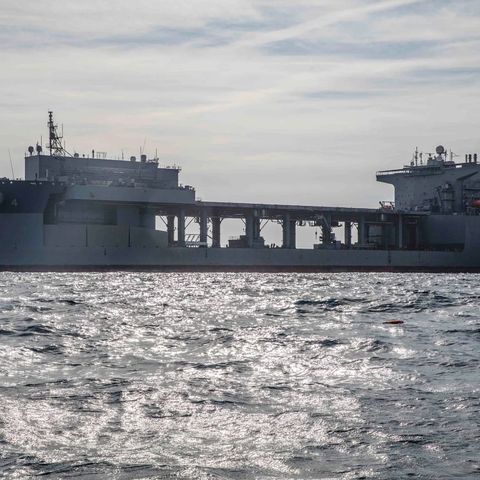Episode 698 - The Music Stopped at MSC, with Sal Mercogliano

Scarica e ascolta ovunque
Scarica i tuoi episodi preferiti e goditi l'ascolto, ovunque tu sia! Iscriviti o accedi ora per ascoltare offline.
Episode 698 - The Music Stopped at MSC, with Sal Mercogliano
Questa è una trascrizione generata automaticamente. Si prega di notare che non è garantita la completa accuratezza.
Descrizione
Where there appears to be a fair bit of shock and surprise in the general public, for those who have tracked the story closest, the feeling could be found along...
mostra di piùThe Navy will reportedly sideline 17 vessels due to a manpower shortage that makes it difficult to properly crew and operate ships across the fleet. …The ships include two replenishment ships, one fleet oiler, a dozen Spearhead-class Expeditionary Fast Transports and two forward-deployed Navy expeditionary sea bases – the USS Lewis Puller, based in Bahrain and the USS Herschel "Woody" Williams, based in Souda Bay, Greece.
The effort is known as the "great reset" and is awaiting approval from Chief of Naval Operations Adm. Lisa Franchetti. The change will reduce Navy demands for officers by 700 mariners.
No amount of spin or PAO squid ink can hide this carbuncle - so we’re going to dive into it on the next Midrats Podcast. Returning to Midrats to get everyone up to speed is Dr. Sal Mercogliano, Chair Department of History, Criminal Justice and Political Science at Campbell University Former merchant mariner, contributor to USNI Proceedings, Sea History, Naval History, and gCaptain. Host of the YouTube channel What's Going on With Shipping.
Summary
The conversation discusses the recent decision by the Navy to sideline 17 vessels due to a manpower shortage. This decision has raised concerns about the impact on the fleet's operational capabilities. The guest, Dr. Sal Mercagliano, explains that this issue has been a long time coming and traces it back to decisions made in the 1980s. He highlights the challenges faced by Military Sealift Command (MSC) in recruiting and retaining mariners, as well as the negative impact of COVID-19 on crew availability. The conversation also touches on the lack of recognition and benefits for CivMars, the civilian mariners who serve on these ships.
The conversation explores the challenges and potential solutions for the Military Sealift Command (MSC) and the U.S. merchant marine. The complex chain of command for MSC and the stringent requirements for civilian merchant sailors are discussed. The need to make it easier for people to transition from active duty to MSC is highlighted. The conversation also addresses the issues of training, leave, and travel expenses for MSC mariners. The low recruitment rate from the U.S. Merchant Marine Academy and the negative experiences of some mariners with MSC are mentioned.
The potential consequences of a shortage of mariners during a crisis are examined. The conversation emphasizes the importance of proper allocation of funds and the need for leadership and recognition of mariners' contributions. The lack of visibility and positive messaging about the merchant marine is discussed, along with the need for a national maritime strategy. The importance of logistics and the challenges of maintaining a strong logistics force are highlighted.
The conversation concludes with a discussion on the need to reevaluate the role of MSC and the potential benefits of reverting some ships from USNS to USS.
Takeaways
- The Navy's decision to sideline 17 vessels due to a manpower shortage raises concerns about the fleet's operational capabilities.
- Recruiting and retaining mariners has been a long-standing challenge for Military Sealift Command (MSC).
- The COVID-19 pandemic has further exacerbated the crew availability issue.
- CivMars, the civilian mariners who serve on these ships, do not receive adequate recognition and benefits for their service. The chain of command for MSC is complicated, which makes life difficult for the Admiral in charge of MSC.
- There is a need to make it easier for people to transition from active duty to MSC.
- The stringent requirements for civilian merchant sailors and the training and travel expenses for MSC mariners need to be addressed and made more efficient.
- The recruitment rate from the U.S. Merchant Marine Academy is low, and negative experiences with MSC can deter mariners from continuing their careers at sea.
- There is a need for a national maritime strategy and better recognition of the contributions of mariners.
- The importance of logistics and the challenges of maintaining a strong logistics force are emphasized.
- Reverting some ships from USNS to USS and putting supply officers in charge of fleets and commands could improve the understanding and management of logistics.
- 00:00: Introduction and Invitation to Join the Conversation
- 02:07: The Navy's Decision to Sideline 17 Vessels
- 05:32: The Long-standing Issue of Personnel Shortage in the Military Sealift Command
- 09:09: The Impact of COVID-19 on the Merchant Marine and the MSC
- 15:23: The Poor Work Environment and Recruitment Challenges
- 26:00: The Importance of Auxiliaries in Supporting Warships
- 29:26: The Potential Repercussions of Sidelineing Vessels
- 31:54: Addressing the Manpower Shortage: Improving Work Environment and Recruitment
- 33:23: The Complex Chain of Command for MSC
- 34:19: Making the Transition to MSC Easier
- 35:34: Increasing Recruitment from the U.S. Merchant Marine Academy
- 36:29: Addressing Negative Experiences and Retention Issues
- 37:50: The Potential Consequences of a Shortage of Mariners
- 40:55: The Importance of Leadership and Resource Allocation
Informazioni
| Autore | Midrats |
| Organizzazione | Midrats |
| Sito | - |
| Tag |
Copyright 2024 - Spreaker Inc. an iHeartMedia Company
